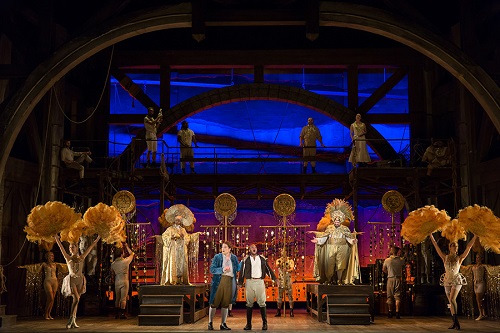 United States Bernstein, Candide: Soloists, Chorus and Orchestra of Washington National Opera / Nicole Paiement (conductor), The Kennedy Center, Washington, DC. 14.5.2018. (RRR)
United States Bernstein, Candide: Soloists, Chorus and Orchestra of Washington National Opera / Nicole Paiement (conductor), The Kennedy Center, Washington, DC. 14.5.2018. (RRR)

Cast:
Voltaire/Pangloss – Wynn Harmon
Candide – Alek Shrader
Cunegonde – Emily Pogorelc
Paquette – Eliza Bonet
Maximilian – Edward Nelson
The Old Lady – Denyce Graves
James the Anabaptist/Martin – Matthew Scollin
Grand Inquisitor/Governor of Montevideo – Alexander McKissick
Cacambo – Frederick Ballentine
Vanderdendur/Baroness – Keriann Otaño
Production:
Director – Francesca Zambello
Associate Director – E. Loren Meeker
Choreography – Eric Sean Fogel
Set Design – James Noone
Costume Design – Jennifer Moeller
Lighting Design – Mark McCullough
Chorus Master – Steven Gathman
Sound Design – G. Thomas Clark
Celebrating the centennial of Leonard Bernstein’s birthday, the Washington National Opera’s first-ever production of Candide is humming along nicely. I attended on Tuesday, 14 May—almost halfway through its run, which ends 26 May.
The potential problem with staging Candide, based on Voltaire’s 1759 novella, is that it is a one-joke operetta. Voltaire’s larger purpose was to attack theodicy, the attempted justification of the ways of God to man—which is how the book ended up on the Vatican’s index of prohibited volumes and was publicly burned by the Calvinists in Geneva. At the operetta’s beginning, Dr. Pangloss announces, ‘God has sufficient reason to act perfectly,’ and therefore, ‘All is for the best in this best of all possible worlds.’ The humor derives from showing how bad things really are in spite of the undiminished optimism of Dr. Pangloss and his student Candide. Is this ironic juxtaposition really funny enough to keep us laughing and engaged for nearly three hours?
Generally, the answer is yes. The reason is twofold. Voltaire keeps us entertained by ratcheting up the level of absurdity. It is almost a game of ‘Can You Top This?’ If you’re still an optimist after losing one leg, how about after losing two? Can anything break through the blind optimism of the main protagonists? Still, the acidic scenario may have become tiresome without the brilliance of Bernstein’s music to accompany it.
The score is in two veins: the most satiric scenes are written in a Rossini-esque style with hilariously high spirits (so evident in the scintillating overture), and the more somber episodes, some of which are romantic, in Bernstein’s inimitable Broadway musical style. The original director of Candide, Tyrone Guthrie, described the amalgam this way: ‘Rossini and Cole Porter seemed to have been rearranging Götterdämmerung’. Drop the allusion to Wagner, and you have a pretty good description of what you hear.
The production is the other asset of the evening. For once, no one thought to displace the setting into modern times and the sets and costumes are generally consistent with the 18th century. One appropriate exception is the scene of Eldorado, a utopia, delivered in a Busby Berkeley or Flo Ziegfeld fashion—very imaginative and amusing. One could imagine the director and costume designer talking back to Voltaire: ‘You want absurdity? I’ll give you absurdity; take a look at this!’
A minor misstep was making the Baron of Westphalia’s son, Maximilian, a flagrant homosexual. Where did that come from? Certainly not from Voltaire or Bernstein. Perhaps its purpose was the cheap laughs it generated. There was also some unnecessary sexual vulgarity, making explicit what was implicit in Voltaire’s text.
Candide’s conclusion lapses into a somewhat conventional musical comedy ending, bittersweet though it is, with the tempered triumph of a now realistic love. It is sustained, however, by Bernstein’s beautiful ‘Make our Garden Grow’, in which Candide now realizes, along with the other characters, that he must set aside life’s larger, seemingly unanswerable questions, and humbly get down to work.
The singing and acting were quite fine. As Candide, Alek Shrader grew in strength throughout the evening, and fully captured the innocence and poignancy of his character. His singing was stellar. Satire can be very funny so long as the characters don’t let on that they know it’s funny. Shrader held the line, as did most of the other principals. The only minor violations were by Wynn Harmon, who otherwise mastered the difficult task of playing both Pangloss and Voltaire. His voice, however, was clearly from the world of American musicals, not from that of opera—not a criticism, only an observation.
As Conegonde, soprano Emily Pogorelc excelled and triumphed with her coloratura work in ‘Glitter and Be Gay’, and gave a powerful portrait of the bitter price of false joy. At only 21 years of age, she clearly has a great career ahead of her. Matthew Scollin was another standout, both as James and — especially — as Martin in ‘Martin’s Laughing Song’.
Conductor Nicole Paiement kept the orchestra on point and in full support of the singers. The players captured the effervescence of the Rossini side of Bernstein’s music, as well as the poignancy of the somber romance.
Robert R. Reilly